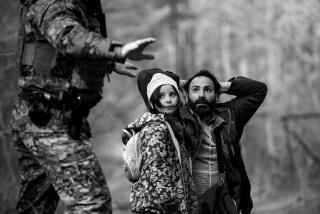Review: Christian Petzold’s thriller ‘Transit’ is hauntingly suspended between past and present
Early on in “Transit,” the quietly extraordinary new movie from the German writer-director Christian Petzold, a man named Georg (Franz Rogowski) arrives at a hotel to deliver two letters, only to discover that their intended recipient has slashed his wrists. Paris is crumbling as German forces march into the city, a waking nightmare that may explain why Weidel, a famous anti-fascist writer, has taken his own life.
Upon arrival, Weidel had asked to stay (and, it seems, to die) in the room he once shared years ago with his wife, a request a hotel worker gladly granted: “When it comes down to love,” she tells Georg, “I just melt.” It’s a poignant throwaway line that nonetheless speaks to Petzold’s own doomy romanticism, even if his tightly constructed, rigorously unsentimental movies don’t melt so much as they slowly, brilliantly incandesce.
The two pictures he directed before this one — “Barbara” (2012), a tale of political resistance set in 1980 East Germany, and “Phoenix” (2015), about a Holocaust survivor rising from the ashes of a bombed-out Berlin — are superbly restrained thrillers that set the forces of history against the persistence of desire. In these conflict zones, love is a force that both clarifies and confuses, sustaining the characters’ will to keep going even as it complicates their survival.
The same holds true in “Transit,” though the contours of a love story, like other crucial details, take a while to emerge. Adapted from a 1944 novel by German writer Anna Seghers, the movie completes a loose historical trilogy that began with “Barbara” and “Phoenix,” though it turns out to be a more mysterious and audacious picture than either. In a bold conceptual gambit, Petzold pries Seghers’ story loose from its temporal moorings and sets it adrift in a vague, unspecified time frame, one that feels as fraught as 1942 and looks as urgent as the present.
As we follow Georg from German-occupied Paris to the port city of Marseille, where he and thousands of other desperate refugees are trying to flee to the Americas, we find ourselves in a France of modern cars and clothes, but with manual typewriters in lieu of computers and smartphones. There are references to cleansings and concentration camps — Georg himself has recently escaped from one — but also inescapable nods to the current refugee crisis. Are the screaming police sirens we hear meant to signify World War II, or some new dystopian hell? Petzold isn’t saying. He strands us alongside his characters between two eras, with the past forever bearing down on the present.
In the terse, jittery opening passages, Georg dodges police, convenes with a resistance group, hops a freight train to Marseille and bids adieu to one more dead man. The movie brings us close to Georg, making palpable his anxiety without losing its steely composure. Petzold, a consummate craftsman, shoots and cuts with a fluid, unfussy rigor. (The director of photography is Hans Fromm; the editor is Bettina Böhler.) Even the occasional scenes of frenzied pursuit feel crisp and measured, as though set to an internal metronome.

Taken together, the vagueness of the setting and the precision of the filmmaking create a gentle but insistent tension. “Transit” has both the evanescence of a dream and the urgent clarity of a newspaper headline. When Georg arrives in Marseille, the city — with its wide-open harbor front and sparsely populated roads — takes on the haunted quality of a sunlit purgatory. Elsewhere, the many scenes at a crowded American consulate, where Georg joins a long line of people trying to secure their exit papers, nod in the direction of a Kafka-esque bureaucratic satire.
“Transit” touchingly illuminates the close bonds that can form within migrant communities, even as it refuses to harbor any illusions about how easily those bonds can be broken. Some of the loveliest scenes transpire between Georg and a young North African boy, Driss (Lilien Batman), and his disabled mother, Melissa (Maryam Zaree), of whom he feels intensely protective, even though he is ultimately powerless to help them.
What little solidarity he might feel with others in the same boat — a music conductor awaiting transfer, a Jewish woman stuck with two dogs she doesn’t want — is undone by a crippling sense of shame and helplessness, as their numbers are winnowed daily during police raids. True to its title, “Transit” is a movie of unexpected comings and goings, entrances and exits. The most frequent image is of Georg opening a door or having a door opened to him, often with a dangerous uncertainty of who might be standing behind it.
Georg has one crucial advantage: He is traveling with the documents of a dead man. When consulate officials mistake him for Weidel, who had secured a transit visa to Mexico, Georg willingly goes along with the deception. But things grow more complicated when he keeps running into Weidel’s estranged wife, Marie (a sad-eyed Paula Beer), who has no idea that her husband is dead and who hopes to be reunited with him in Marseille. In the movie’s most ardently romantic touch, Georg becomes smitten with Marie and longs to take her with him to Mexico, but cannot bring himself to tell her the shattering truth.
There are many secrets, false fronts and suggestive mysteries tucked into “Transit,” not least the identity of the movie’s third-person narrator, whose voice-over further complicates our sense of time and perspective. At a certain point, the story doesn’t seem to be advancing so much as running in circles, becoming a narrative microcosm of history repeating itself. There’s a repetitive, even ritualistic quality to Georg’s pattern of encounters and re-encounters, and also a heavy smattering of coincidence: The frequency with which he keeps seeing Marie raises the perversely cruel notion that fate has brought them together, even as it seems bent on keeping them apart.
Petzold is a devoted student of traditional Hollywood genres and styles, especially film noir (his 2008 picture “Jerichow” was a remake of “The Postman Always Rings Twice”). One of the consistent pleasures of his work is the poker-faced intelligence and political acuity he brings to stories unapologetically governed by the contrivances of melodrama. “Phoenix,” a companion piece in many ways to this movie, was predicated on a similarly preposterous and equally wrenching case of mistaken identity, suffused with tragic echoes of everything from “Vertigo” to the myth of Orpheus and Eurydice.
“Transit” recalls those touchstones as well, even as it loosely reworks “Casablanca.” But in the end, it carves out an imaginative space all its own, setting us adrift in time and history with Rogowski’s Georg, whose delicate features and haunted presence begin to tear their way into your brain. He is both a man without a country and a classic Hitchcockian wrong man, as well as a strangely ideal guide to this grim nether-world — a repository of the lost and forgotten souls of Europe from the last century, the present one and possibly the next.
-------------
‘Transit’
In French, German with English subtitles
Not rated
Running time: 1 hour, 42 minutes
Playing: Laemmle’s Royal Theatre, West Los Angeles
[email protected] | Twitter: @JustinCChang
More to Read
Only good movies
Get the Indie Focus newsletter, Mark Olsen's weekly guide to the world of cinema.
You may occasionally receive promotional content from the Los Angeles Times.











